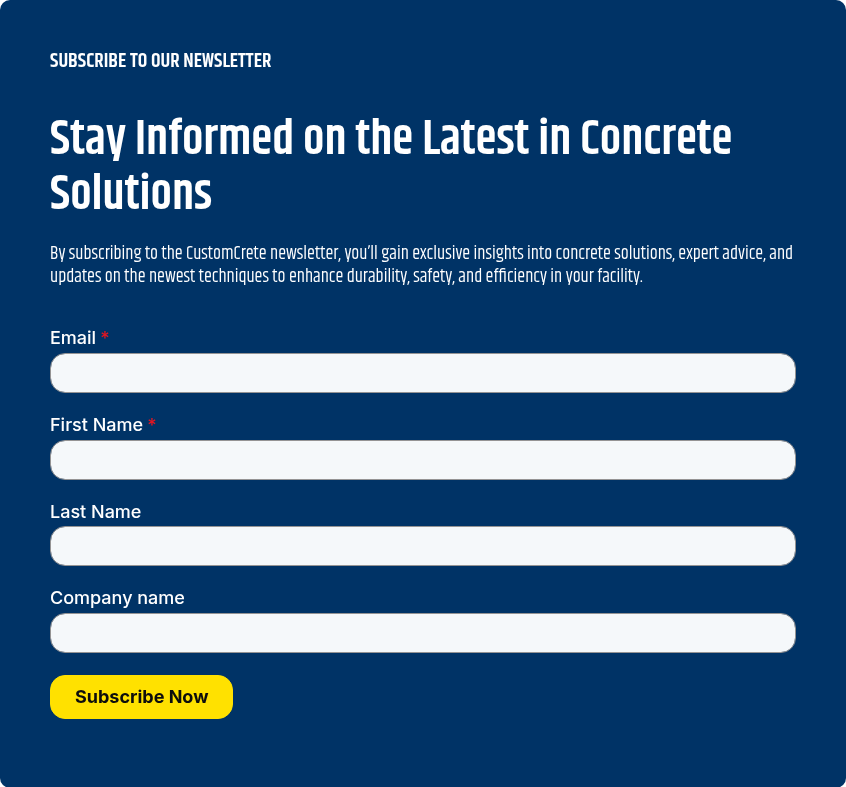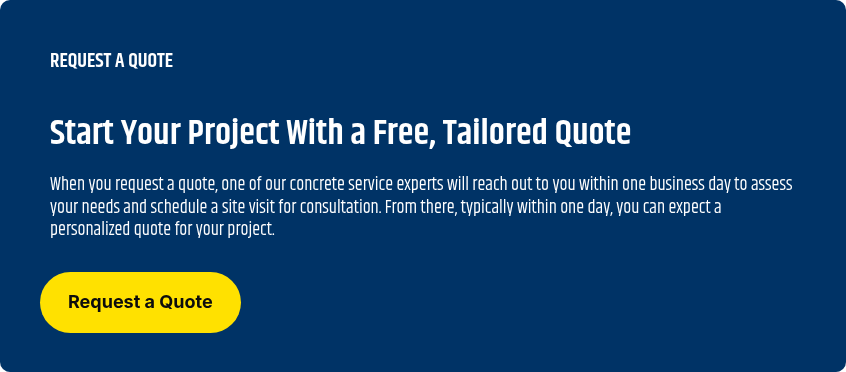The Best Concrete Coating Systems for Heavy Manufacturing Equipment
July 30th, 2025
3 min read
By Tom Dassie

In heavy manufacturing, the floor is more than just a surface—it’s a critical part of the operation. Every day, it supports the weight of large machinery, endures constant movement, and resists exposure to oils, chemicals, and debris. A weak or uncoated floor can lead to costly damage, unsafe conditions, and unnecessary downtime.
That’s why selecting the right concrete coating system is one of the smartest investments heavy equipment manufacturers can make. In this article, we’ll walk through what to look for and which coating systems offer the best performance for your operation.
Why Flooring Matters for Heavy Equipment Manufacturers
Heavy manufacturing facilities face unique stressors that traditional flooring systems simply aren’t built to handle. Concrete alone can crack, stain, or erode over time without added protection—especially when supporting thousands of pounds of equipment and materials.
Key challenges in these environments include:
- Extreme weight loads from machinery and tooling
- Vibration and movement from production lines or mobile equipment
- Oil, grease, chemical, or coolant spills
- Thermal expansion from ovens or hot processes
- Constant wear from carts, forklifts, and foot traffic
The right coating system protects the floor beneath, improves safety, simplifies cleaning, and extends the life of your facility.
What to Look for in a Coating System
When evaluating flooring for heavy equipment manufacturers, look for systems that offer:
1. High Compressive and Impact Strength
The coating must resist damage from static machinery and dropped tools or parts.
2. Abrasion Resistance
Daily foot and vehicle traffic wears floors down. Coatings should withstand friction and constant use.
3. Chemical and Oil Resistance
Spills shouldn’t eat away at your floor or cause permanent staining. Choose coatings that resist industrial oils, coolants, and solvents.
4. Non-Slip Textures
Safety is always a priority. Adding grit or texture can prevent slip hazards, especially in high-traffic or spill-prone areas.
5. Ease of Maintenance
Seamless, sealed systems are easier to clean and resist buildup of dirt or grime.
Top Concrete Coating Systems for Heavy Manufacturing
Several systems are engineered to support the demands of heavy manufacturing environments. Here are the best-performing options:
Epoxy Floor Coatings
Epoxy is one of the most widely used coating systems in manufacturing settings due to its balance of cost, durability, and customization.
Benefits:
- High compressive strength for machinery and equipment
- Chemical and stain resistance
- Available in multiple colors and finishes, including anti-slip
- Can be built up in thickness to improve impact resistance
Limitations:
Epoxy is rigid and may not handle extreme thermal shock or repeated high impacts without reinforcement.
Best for:
Machine shops, assembly lines, equipment staging areas, maintenance bays.
Urethane Cement Systems
Urethane cement (also called urethane mortar) is a powerhouse system for environments needing maximum durability. It bonds well to concrete and holds up under harsh physical and chemical abuse.
Benefits:
- Exceptional resistance to impact, abrasion, and heavy traffic
- Handles extreme temperature changes (ideal near ovens or furnaces)
- Chemical-resistant, moisture-tolerant, and seamless
- Long lifespan with minimal maintenance
Limitations:
Higher upfront cost and more complex installation process than epoxy. Typically requires professional installation.
Best for:
Heavy assembly areas, forging or welding stations, chemical processing zones, and environments with frequent washdowns or extreme heat.
Epoxy/Urethane Hybrid Systems
Some facilities benefit from a layered approach: applying an epoxy base for chemical and stain resistance, followed by a urethane topcoat for impact and abrasion resistance.
Benefits:
- Combines strengths of both systems
- Customizable thicknesses and finishes
- Improved protection in mixed-use zones
Best for:
Facilities with both chemical exposure and mechanical abuse (e.g., CNC machining centers, fabrication areas).
Additional Performance Features to Consider
Beyond durability and chemical resistance, certain performance upgrades can make your manufacturing floor even more efficient, safe, and tailored to your facility’s workflow.
Line Striping
In heavy manufacturing, clearly marked zones for walking paths, forklifts, and equipment storage help maintain safety and efficiency. Coating systems can incorporate striping and color zones directly into the floor.
Joint Fillers
Control joints are necessary in concrete, but they’re also a common failure point. Joint fillers help protect equipment wheels, reduce trip hazards, and maintain a level surface under heavy loads.
Anti-Static Properties
If your facility works with electronics or flammable materials, anti-static coatings can help dissipate static electricity, protecting your products and workers.
Common Mistakes to Avoid
When selecting a coating for a heavy-use environment, it’s important to avoid shortcuts:
- Skipping proper surface prep: Even the best coating will fail without correct mechanical preparation. Grinding or shot-blasting ensures long-term adhesion.
- Choosing a thin or decorative-only coating: These systems aren’t built for industrial abuse and will wear down quickly.
- Overlooking safety features: A high-gloss floor may look clean but can become slippery. Always ask about textured or matte options.
- Trying to DIY a complex system: Most high-performance systems require expert installation for warranty coverage and longevity.
Final Thoughts
For heavy equipment manufacturers, a durable concrete coating is more than a finishing touch—it’s an essential part of the production environment. The best coating systems protect your facility, support your equipment, and create a safe, efficient workspace for your team.
Whether you choose epoxy, urethane cement, or a hybrid system, the key is matching your flooring solution to your daily demands.
Want expert guidance on the right concrete coating system for your facility? Read our next article, “What Industrial Concrete Flooring Solution is Best for Forklifts?”.
















.jpg?width=7008&height=4672&name=CC101560%20(1).jpg)




.jpg?width=2048&height=1365&name=6%20(2).jpg)



